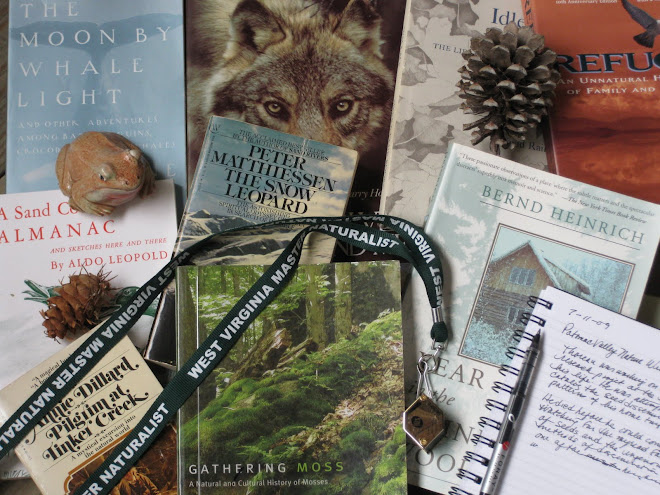 Next up is Kim Todd's first book Tinkering with Eden, A Natural History of Exotics in America. Her other books are Chrysalis and Sparrow.
Next up is Kim Todd's first book Tinkering with Eden, A Natural History of Exotics in America. Her other books are Chrysalis and Sparrow.Todd's articles and essays have appeared in Orion, Sierra Magazine, California Wild and Grist, among other places. She has taught environmental and nature writing at the University of Montana, the University of California at Santa Cruz extension, and the Environmental Writers Institute. She currently teaches at Penn State, The Behrend College. Todd is a senior fellow with the Environmental Leadership Program.Todd has given talks at the Harvard Museum of Natural History, the New England Aquarium, the Getty Museum, the Commonwealth Club, Yale University, Bowdoin College, Wellesley College, the University of California (Davis), and many other venues. She has an M.F.A. in creative nonfiction and an M.S. in environmental studies, both from the University of Montana, and B.A. in English from Yale. The following information is from the author's website:
Tinkering with Eden is that rare thing, a profoundly important cautionary tale that is at the same time, both illuminating and entertaining."--William Kittredge, author of Nature of Generosity
Since Europeans started settling North America, exotic species have flooded in, becoming so prevalent that many Americans can't tell which species are native and which are not. Tinkering with Eden tells the stories of seventeen of these species, from the starling, introduced in 1890 by a man who wanted to bring all the birds mentioned in the plays of Shakespeare to New York's Central Park, to the gypsy moth, imported by a naturalist who was trying to breed a silk worm that would survive New England winters. The book details the disasters unleashed with many exotics, as well as the few success stories, like the Vedalia ladybug from Australia that saved the California citrus industry.
Reviews
The New York Times Book Review You really can't fool Mother Nature, as Kim Todd vividly shows in her fascinating, cautionary first book.
Booklist Imagine the common birds of city and suburb, the ones we all see daily as they perch on phone wires and peck for crumbs on the sidewalk. The three most numerous species in our imaginations—starlings, pigeons, and house sparrows—are all exotic, non-native birds that were deliberately introduced to North America from Europe. In this fascinating history of the introduction of exotic species, Todd gives the reader the story behind the initial introduction of each species as well as its status today.
The New Yorker The pigeons fluttering in public spaces, nutria in Southern swamps, gypsy moths across New England -- all these are the thriving, abundant relics of abandoned experiments, most of them well meant.
Grist Magazine Todd weaves 17 tales of past and present exotic organisms that have staked their claim in North American soils -- abetted, of course, by their human companions. With a healthy dose of sympathy for her human characters, Todd clarifies the complicated, wonky world of Exotic Pest Plant Councils and feral animal eradication.
Bookpage Tinkering with Eden -- a fascinating narrative enhanced by Todd's far-reaching research and rich story-telling abilities -- explores nature and humankind's relationship to it. A former newspaper reporter, the author has a fresh voice, an inquisitive mind and the instinct to ask questions about ordinary things the rest of us take for granted. Her book will interest any caring observer of our environment or lover of mystery.
On Earth—Magazine of the National Resources Defense Council Author Kim Todd has chosen a small selection of these stories to tell, each a short but richly detailed narrative of how and why a particular species has come to be considered American. Readers will get reacquainted with common pigeons (from France), honeybees (from England), and brown trout (from Germany). They'll also meet lesser-known transplants, like blood-sucking sea lampreys, colonies of monkeys, and orange-toothed nutrias.
Outside Magazine Reaching back to the original farmers, crackpots, and scientists who opened this biological Pandora's box, Todd uncovers a Greek tragedy of human heedlessness....[B]eautifully written natural history.
California Wild Todd eloquently explains how one man single-handedly brought European starlings to New York’s Central Park, why brown trout (Salmo trutta) arrived in 1883 as a generous gift from Germany, and how gypsy moths (Bombyx dispar) were imported into Massachusetts to try to jumpstart the country’s silk industry. In all cases, Todd weaves myth, fact, and humor into interesting stories that enlighten us about our everyday surroundings.
The Austin Chronicle Kim Todd's Tinkering With Eden provides a clear, objective harbinger of how much the introduction of exotic species in America has changed the landscape since Christopher Columbus first set foot this side of the Atlantic.
Discover Magazine Todd re-creates the all-too-often neglected human dramas— and sometimes farces— that attended the arrival of nearly a score of exotics, including Canadian mountain goats in Washington State, Chinese pheasants in Oregon, and the European gypsy moth in Massachusetts.
Click on Kim Todd's website link at top to read an excerpt. We meet on April 25 to discuss. Email pvnaturewriters@gmail for further information.


